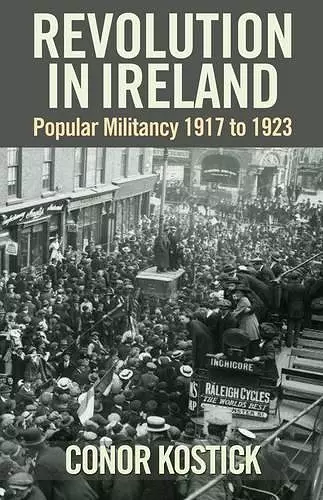Revolution in Ireland
Popular Militancy 1917 to 1923
Format:Hardback
Publisher:Cork University Press
Published:21st Oct '09
Currently unavailable, and unfortunately no date known when it will be back

The years from the Easter Rising in 1916 to the ending of the Civil War in 1923 were years full of drama and of fast-changing events, whose outcome shaped Irish society for generations. The conventional narrative of this period is one that focuses on the efforts of the nationalist politicians of various hues and the military activities of the IRA in their struggle to escape the British Empire. But these were also years of extraordinary popular initiatives, directed against both the British administration of the Ireland and indigenous employers. Over a hundred 'soviets' were proclaimed in the period. This book studies the militancy of working people throughout urban and rural Ireland during these revolutionary years. It examines how this popular militancy impacted on the struggle for independence: how it shaped the policy of the British authorities; how leaders of the national movement, such as de Valera and Collins, were affected by the popular struggle; and how the ebbs and flows of the popular movement were closely intertwined with the issue of partition. This book provides a great deal of detail on working-class militancy between 1917 and 1923. It stresses the large scale and considerable impact of mass action and labor activism, challenging traditional interpretations that focus almost exclusively on the role of armed groups. There is a full account of the strikes, factory occupations and land seizures that shook Irish society. It details popular involvement in the struggles of those years, paying particular attention to the socialist and trade union movement. This revised edition consists of a comprehensive rewrite that updates the work in the light of recent publications and the release of new archive materials. In particular, this new edition includes new eyewitness accounts from the archives of the Bureau of Military History including the testimony of notable trade union activists, an extension of the account of the mutiny of the Connaught Rangers (28 June 1920), and extra information on Michael Collins' intelligence system.
This brave and original book, which uncovers with meticulous skill a whole suppressed history, challenges the assumptions of orthodox nationalist and liberal revisionist alike. Terry Eagleton, Professor of Cultural Theory, University of Manchester Written with the polemical verve of a committed socialist, this book contains a great deal of detail on working-class militancy between 1917 and 1923 that won't be found elsewhere. An important contribution to Irish historiography, it stresses the extent and impact of mass action and labour activism, challenging traditional interpretations that focus almost exclusively on the role of armed groups. An excellent study that deserves to be widely read. Fintan Lane, editor Politics and the Irish Working Class Now there is a book covering the entire period ... The great value of Kostick's book is that it brings together a wealth of information about the hidden history of ordinary people in Ireland fighting to dump the bosses off their backs. The struggles our grandparents and great grandparents engaged in are inspiring. Workers Solidarity An excellent counter- weight to the mass of Collins biography, which forgets the location of the revolutionary period. Dr Mike Cronin, History, Sheffield Hallam University This book ... is much better researched than the norm and thus serves as a useful survey of an under-appreciated phenomenon in Irish political history. As a comprehensive and clearly told narrative it will be useful to many. Times Change (Dublin) Kostick's book ... might be regarded as revisionist in the best (or proper) sense of the word in that it is a genuine re-examination and reassessment of the period rather than just a refutation of the accepted view ... Obvious enthusiasm for his subject ... The strength of Kostick's book is that he is not side-tracked by theoretical arguments but instead marshals an impressive array of evidence to support his case ... Kostick's work is impressive ... As a study of the social turmoil and the depth of militancy at this time Kostick's is a very good book and one well worth reading. Books Ireland For the first time in one book there is a full account of the strikes, factory occupations and land seizures which shook Irish society. Socialist Review An essential addition to the library of any progressive interested in Ireland. Morning Star A useful summary of militant activity and a corrective to the conventional orthodoxy which would almost completely dismiss the social dimension of the Irish revolution. Irish Historical Studies This remains an invaluable book, one of the most important recent contributions to our understanding of the period from 1917 to 1923. Irish Studies Review A stirring, celebratory account that fully succeeds in establishing the tremendous scale of working-class revolt, both in the countryside and in the towns. Strikes, general strikes, occupations and demonstrations, were all an important part of the years from 1917 to 1923, and future studies of the period will ignore this dimension of the period at their peril. John Newsinger, Senior Lecturer, Bath Spa University
ISBN: 9781859184486
Dimensions: unknown
Weight: unknown
256 pages
2nd Revised edition